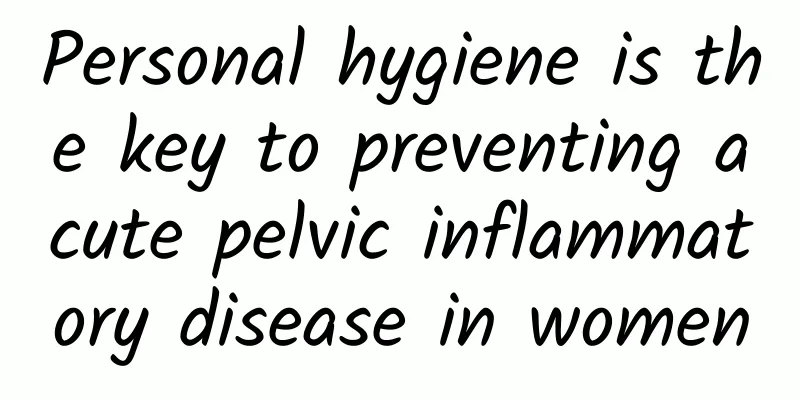Personal hygiene is the key to preventing acute pelvic inflammatory disease in women

|
Personal hygiene is the key to preventing acute pelvic inflammatory disease in women 1. Do a good job of health publicity during menstruation, pregnancy and puerperium: keep the genitals clean and dry, wash the vulva with clean water every night, use a special basin, and do not mix them up. If there is no vulvovaginal inflammation, avoid using various detergents to clean the vulva, but it will be counterproductive. Choose cotton and loose underwear. Tight underwear is not easy to wear for a long time, which can easily provide a good growth environment for bacteria. 2. Strictly grasp the indications of obstetric and gynecological surgery, and make good preoperative preparations: pay attention to aseptic surgery, including artificial abortion, diagnostic curettage, placement of intrauterine contraceptive device, etc. Vaginal bleeding may occur after common surgical examinations. During this period, sexual intercourse, bathing, and postoperative care must be prohibited to prevent infection. 3. Pay attention to sexual hygiene: Reduce sexually transmitted diseases. Generally, sexual intercourse is a direct way for infectious bacteria to spread. Therefore, sexual intercourse is prohibited during menstruation. Pay more attention to personal hygiene in daily sexual life. 4. Seek medical treatment promptly: If you feel unwell, you must seek medical treatment actively. Do not take it lightly and do not come to the hospital for treatment. This will delay the disease and bring more serious consequences. 5. Thorough treatment: If you unfortunately suffer from acute pelvic inflammatory disease, you must seek timely treatment, maintain a good attitude, and thoroughly cure pelvic inflammatory disease to prevent it from becoming a chronic disease. |
<<: Is adenomyosis contagious?
>>: What is the reaction after ovarian cyst surgery?
Recommend
Women near menopause can try expectant treatment for uterine fibroids
Usually women need to find the right treatment fo...
Coffee: Pregnant women who drink coffee are more likely to have miscarriages and their fetuses may be deformed
Canadian researchers recently found that caffeine...
How much does it cost to treat vulvar leukoplakia?
How much does it cost to treat vulvar leukoplakia...
Natural pregnancy rate of chocolate cyst
Natural pregnancy rate of chocolate cyst After a ...
Tips on how to lose weight that you must know (Part 1)
Is it frustrating: Why can your friend stay slim ...
How does vaginal inflammation develop?
How does vaginal inflammation develop? Vaginitis ...
What is the nursing method for moderate cervical erosion?
Moderate cervical erosion is also a type of cervi...
How much does it cost to check for vaginal candidiasis during pregnancy?
How much does it cost to treat candidal vaginitis...
5 tips to eat glutinous rice balls on the winter solstice without getting fat! Can you tell the difference between glutinous rice balls and Yuanxiao?
The winter solstice is the day with the shortest ...
Which hospital is best for treating cervical warts?
Patients all know that cervical warts are one of ...
[PK Online Rumor] Can catechins burn fat? Zhao Hanying said so...
It is widely rumored on the Internet that "d...
What are the main factors that cause women to get ovarian cysts?
What are the main factors of ovarian cysts? I thi...
How many days of pregnancy does it take to do a painless abortion?
Painless abortion is usually performed between 6 ...
Briefly talk about the precautions for patients with cervical erosion after surgery
Nowadays, more and more women suffer from cervica...
Dietary considerations for women with early menopause
Menstruation is like a good friend to every woman...









